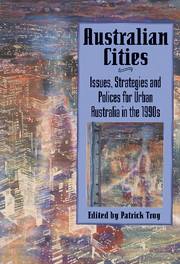Book contents
- Frontmatter
- Contents
- List of Figures
- List of Tables
- Preface
- Acknowledgements
- Note on Contributors
- Abbreviations
- Introduction
- Part I The Development and State of Australian Cities
- Part II Current Policies and Options
- 5 The Battle for Balmain
- 6 State Planning Operation
- 7 Planning in a Multicultural Environment: A Challenge for the Nineties
- 8 Local Government and the Urban Growth Debate
- 9 Towards More Equitable Cities: A Receding Prospect?
- Part III Avenues for Development
- References
- Index
9 - Towards More Equitable Cities: A Receding Prospect?
Published online by Cambridge University Press: 03 May 2011
- Frontmatter
- Contents
- List of Figures
- List of Tables
- Preface
- Acknowledgements
- Note on Contributors
- Abbreviations
- Introduction
- Part I The Development and State of Australian Cities
- Part II Current Policies and Options
- 5 The Battle for Balmain
- 6 State Planning Operation
- 7 Planning in a Multicultural Environment: A Challenge for the Nineties
- 8 Local Government and the Urban Growth Debate
- 9 Towards More Equitable Cities: A Receding Prospect?
- Part III Avenues for Development
- References
- Index
Summary
The pursuit of social justice via the various urban programs of both the Commonwealth (Building Better Cities) and the States has been compromised well into the 1990s by the accelerated restructuring of the Australian economy and the high unemployment that will persist in its wake. The likelihood is that whilst recovery is now underway, even the more optimistic forecasts of economic growth (3–4 per cent) will not create enough jobs to lower unemployment much beyond 5 or 6 per cent before the end of the decade. According to a recent report on the medium-term outlook for the economy prepared by the Economic Planning Advisory Council (EPAC) (1993), this would still leave between 140 000 and 220 000 long-term unemployed out of work by the year 2001, and pockets of ‘hard-core’ poverty and inequity within the cities. The federal Labor administration has to bear a major part of the responsibility for this given the policies pursued throughout the 1980s, not the least being the over-reliance on monetary stimuli at the expense of fiscal measures.
This claim is followed through in the second section of this chapter by examining some of the income and wealth effects in the markets for labour, housing, and public services that I believe will make for a more rather than less unequal Australian society.
- Type
- Chapter
- Information
- Australian CitiesIssues, Strategies and Policies for Urban Australia in the 1990s, pp. 196 - 218Publisher: Cambridge University PressPrint publication year: 1995
- 14
- Cited by



